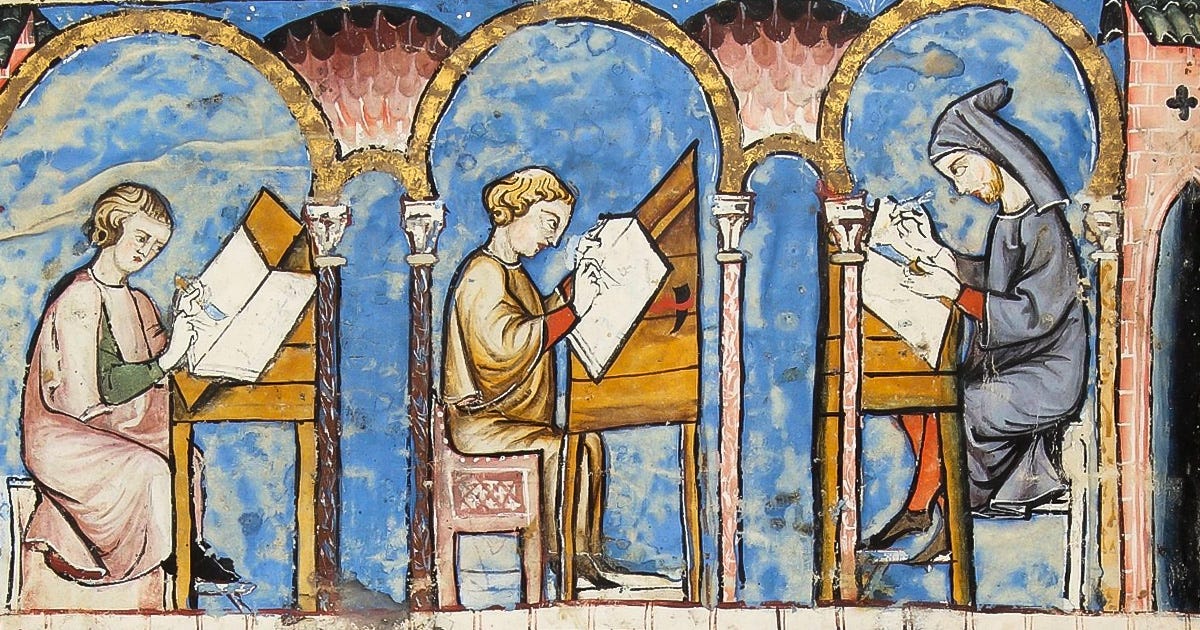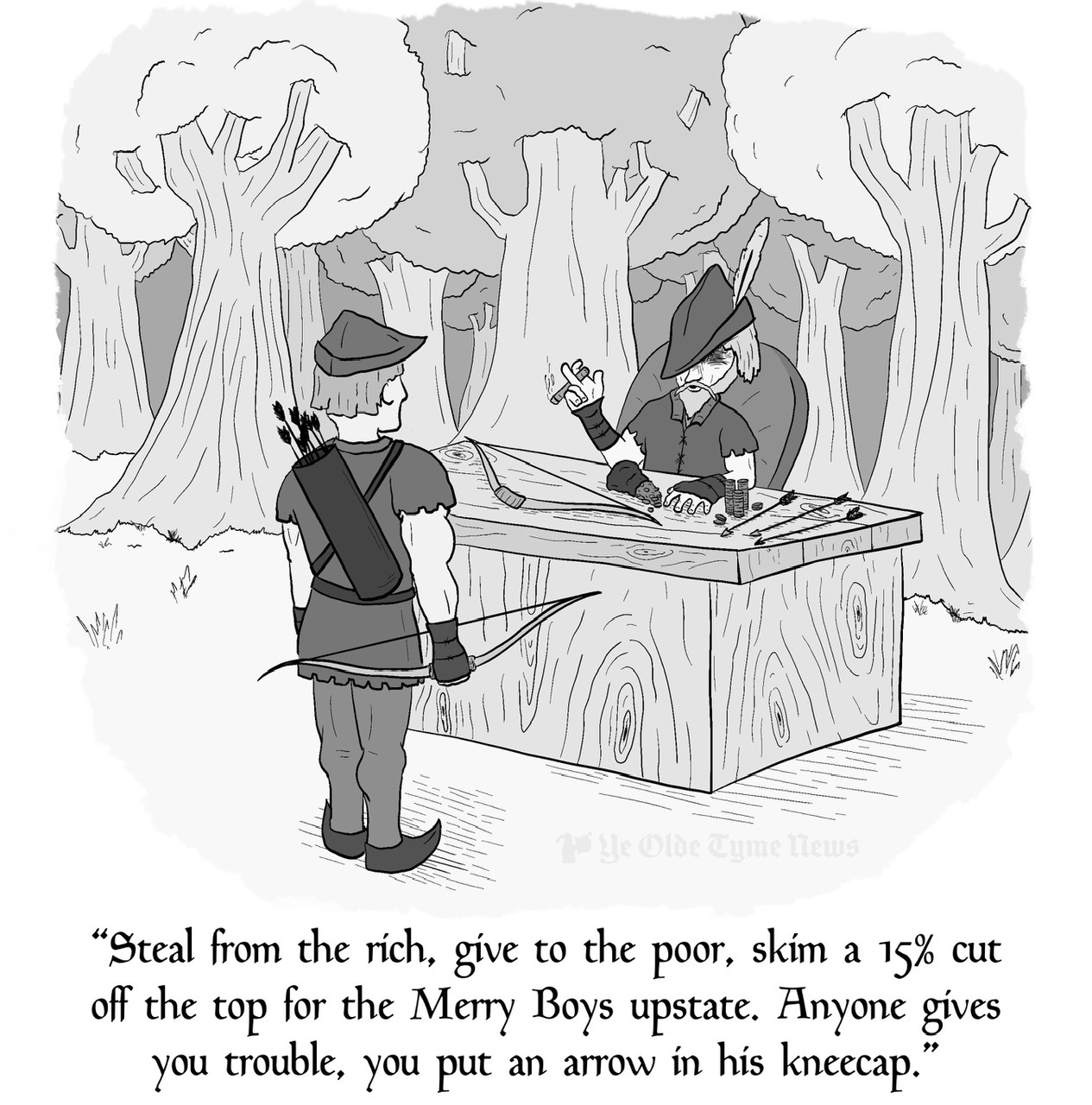King Rewrites All Books to Remove Offensive Parts About Peasants Having Money
Thou shalt be offended no longer

In a decree that hath been lauded by lords and lowborne swine alike, His Majesty The King hath ordered all books in the Kingdom rewritten to get rid of the offensive parts about peasants having money.
“Rags to riches? Ho-ha! What a farce!” spake Trumannus Wærloga, Chief Truthistician of the Royal Ministry of Propaganda and Unerring Truthfulness. “I do say, a tale of a peasant who doth his duty then dieth in the fields offers much more appropriate lessons for today’s youth. We wouldn’t want to poison their feeble minds with ideas about social mobility, now would we?”
This moste forward-looking initiative shall remove any scandalous mention of peasants being paid, ogres being accepted into society, and womyn owning things. Whilst the programme wast spearheaded by the Kingdom’s élite thinkers, it hath also gained widespread support amongst poors.
“I don’t know how to read, I don’t have money, and books are more expensive than my house,” spake local peasant Coppice Pollarding. “So I suppose these changes are factually correct.”
The updates are part of a broader effort by the Royal Ministry of Propaganda and Unerring Truthfulness to ensure that popular works of literature doth not offend anybody that matters. Experts say these tymeless stories shall help future generations of peasants to more submissively accept their humble lot in lyfe, whilst not provoking the ire of the fairer classes with threatening tales of upwardly mobile commoners.
Below are some examples of stories that shall be reimagined to be less offensive to people who hate peasants.
The Prince Who Marries the Attractive Peasantess. The peasantess cuts her feet and never makes it to the ball, thus learning that glass is an outrageously inappropriate material for footwear. The prince instead marries a lady equal to his social station who is not conventionally attractive but nevertheless provides an ample dowry. He later takes the bosomly peasantess as his concubine, which is a perfectly suitable occupation for a common wench to aspire to.
Seven Hobbits and the Pasty Lady. A pasty lady is cast into the forest by a cruel and not-quite-as-pasty queen, who is jealous because pastiness is a desirable trait in her society. She wanders into the hobbits’ house in the middle of the night seeking shelter. Jumpy kills her with a crossbow after mistaking her for a home invader.
The Street Child Who Finds a Magick Lantern then Wishes Himself to Become a Prince. A genie offers to grant the boy three wishes. He’s been locked in the lantern for 10,000 years and only speaks an ancient and long-extinct language, so nobody has any idea what he’s saying. The boy trades the lantern for drugs then gets run over by a camel.
The Wealthy Beast Who Kidnaps a Local Townswomyn and Imprisons Her in His Castle. The townspeople harbour suspicions about the depraved acts going on betwixt the girl and the beast, but the subject is taboo so they don’t investigate further.
The General Contractor Who Was God’s Son. A child of such high birth shan’t be treated with such disrespect. In the new version, God uses his government connections to get his son released from prison with a clean record. The Son goes on to a successful career as a vintner. The meek don’t inherit the Earth, or anything else for that matter.
The Slumbering Dame. An evil witch curses a beautiful princess to a hundred years of sleep. When the princess awakens, she embarks on a violent witch hunt, burning thousands of accused witches at the stake in a decades-long reign of terror. The carnage only ends when the evil witch’s head is on a pike and the entire kingdom has been converted to Christianity. The princess dies of cholera and is ordained a saint.
The Knight Who Dies in Battle. Not possible. Only poor people are killed in battle. Full rewrite.
Robyn Hode. The Merry Men steal from both rich and poor alike, give to fund their own entrenched corporate interests, and skim a 15% cut off the top.
Addendum: The Book of Games
The main image for today’s article comes from the 1283 Libro de los juegos, a Spanish translation of Arabic texts on a variety of board games of the time. Wikipedia tells me it’s the oldest surviving document on European table games, as well as the earliest European work on chess.
The author says board games are superior to sports and other types of physical games, because they can be played by women, old people, and others types of weaklings:
“…but because these latter games are played sitting they are everyday and they are done as well at night as in the day; and because women who do not ride and are confined are to use them; and also men who are old and weak, or those who like to take their pleasures separately in order not to be irritated or grieved by them; or those who are under another’s power as in prison or captivity or who are at sea.”
Among the games covered in the book are:
Chess. The “noblest” of all games, according to the author. “The pawns are to be made in the manner of common people who are armed and outfitted when they want to fight.”
Various types of dice games. Included are games called Triga, Hazard, Panquist, Half Hazard, Raised Hazard, and Guirguiesca.
Table Games. These games combine strategy with chance. Among them are the games:
Drop Dead
Twelve Dogs or Twelve Brothers
The Quest
Common Puff, and everybody’s favorite…
Courtly Puff
The original manuscript can be viewed online here. A PDF translation by Sonja Musser Golladay is available online here.




